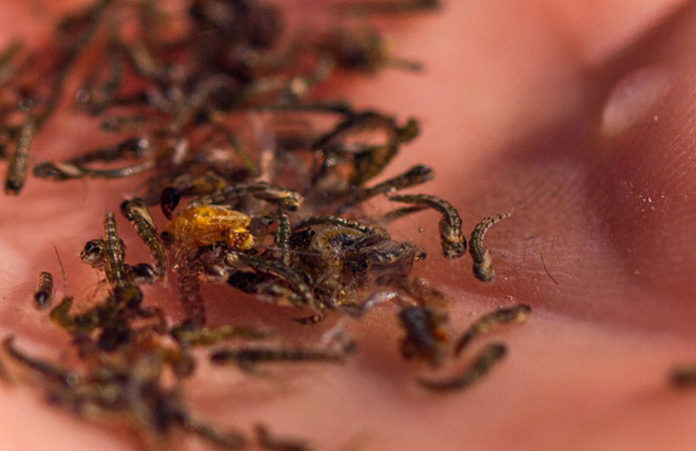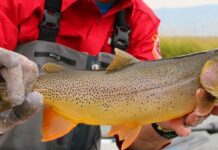Knowing which bugs are likely to hatch can give you an an advantage on the water.
Photo by Patrick Fulkrod
Last year, we introduced a new weekly “Ask the Experts” Column and asked you to pose some questions for our panel of experts. Our latest question for them to chew on is: “What are one or two things that most fly fishers don’t do that they should? (i.e. hook sharpening, line cleaning, etc., anything you think of)”
Their answers are below. If you’ve got a question you’d like to ask our panel, write it in the comments section below.
Joe Demalderis, Cross Current Guide Service (Milford, Pennsylvania):
Number one, numero uno: practice their casting. No one gets good at something without practice. Golfers, artists, fly tiers, writers, you name it, all take practice to get good at. I tell aspiring fly rodders to keep a rod rigged and ready to go and leave it where it can easily be had. Then take just ten minutes a day and cast. Do that every day for two weeks, and then witness your improvement in casting. Ten minutes six times a week beats once a week for an hour. But stop at ten, don’t keep going until you “get it right.” That’s the purpose of ten minutes a day: It will become right.
The second thing is cleaning their fly line. A clean line is like a new line, casts better, and has less of a tendency to twist simply through the cleaning process straightening the line out again. The line thing follows to another third thing, and that’s having a good line to start off with. I see too many high performance rods, slick-as-can-be reels, the latest and greatest waders, and fifty-dollar nippers, but an old, cracked and worn out fly line. Lines don’t last forever, and as part of the overall rig, a good line will bring out the best in a fly rod. And speaking of fly line, line control. That’s huge. So to keep this at two things, just lump together the above under the classification of fly line. Pay attention to it when it’s on and off the reel.
Tim Linehan, Linehan Outfitting Co. (Troy, Montana):
One of the most neglected areas I see from anglers across the spectrum is line maintenance. We all have a predisposition to consider rods and reels as the primary gear surrounding our fishing needs. And we all seem to take pretty good care of our rods and reels to that end. In my opinion, lines are actually more important, in many respects than any other piece of gear. Without a good line, or the right line for the job, you’re often not even in the game. Think of it this way: Lines deliver the goods in the end. And if it’s cracked, dirty, old, etc., a line will not function properly and will result in less-than-efficient delivery of the goods–which will decrease your chances of success.
Jenny Mayrell-Woodruff, Flyfish Beaver’s Bend (Broken Bow, Oklahoma): :
Fly anglers should work their way into the water with their fly presentations. Focus on the water closest to you, and then slowly make your drifts across a stream. This is a great way to minimize spooking fish with the line and working the water more productively. On another note, anglers should focus on making shorter drag-free drifts. Clean drifts with less line to manage should produce more fish!
Capt. Dave Pecci, Obsession Charters (Charlotte Harbor, Florida):
Many times I find that anglers don’t wear appropriate apparel. The current fashion trend is bright neon shirts and hats. While these are great for going out to eat or directing traffic, they are not a good choice for fly fishing. The fish see you and spook or get lockjaw. Wear clothing that makes you look like the sky, a cloud, or the shoreline.
Capt. Chuck Hawkins, Hawkins Outfitters (Traverse City, Michigan):
At the risk of sounding like a broken record, practice, practice, practice. If the fly isn’t getting where it needs to be and controlled the way it should be everything else that an angler has done is a waste.
My guess is that this will be the number one response from all of the experts.
Beyond that:
- Loosen your drag when putting a reel away.
- Check your tippet spools for strength at the beginning of the season.
- Lubricate and clean your fly lines regularly.
- Learn to cast with your off hand; it’s a very valuable skill when you’re fishing from a boat.
- Learn to effectively cast a sink-tip line.
Brown Hobson, Brown Trout Fly Fishing (Asheville, North Carolina):
I see a lot of clients who don’t mend the last couple feet of their leader. I was originally taught to mend my line without moving my fly, and I think many anglers were also. I see clients mend all but the last bit of leader when floating in a drift boat. They never get the microdrag out of their drift and subsequently miss probably 40% off the opportunities they could have gotten. It’s amazing how many more eats you get when the mend is 100% perfect. I’ve learned that when mending, the first goal is to get your fly line and leader, correctly positioned, and then if possible disturb your fly as little as you can. I often cast a few feet too far so that when I mend, I can pull the fly into position with my mend.
Capt. Lucas Bissett, Low Tide Charters (Slidell, Louisiana):
In saltwater sight-fishing fishing situations, two things I have noticed people could do better would be to stay focused and keep calm and also make adjustments quickly.
Mike Canady, Ellensburg Angler (Ellensburg, Washington):
I would say one really important thing that a lot of anglers don’t do and that is practice, if you look at any other sport out there, and I mean any sport, people practice to get better. I truly believe that if an angler really wants to catch more fish, they need to practice. If an angler just goes to the local park or even their yard, they can setup a few hula hoops for target practice. Even if it is once a week or once every two weeks, they only need to practice for 15 to 20 minutes to help develop muscle memory, which will make them become better casters and overall anglers.
Stefan Woodruff, Ellensburg Angler (Ellensburg, Washington):
There are a lot of small things that we as fly fishers should do to improve our success. That being said, there are two big ones that I see in my boat time and time again. The first is not checking your knots/tippet for strength. Anytime I tie a new knot, I pull as hard as I can on it, looking for the line slipping or outright breaking. Crappy knots mean lost fish, so a quick on-the-water strength test can save your day. The same goes for tippet, especially right after hanging up on a rock or the bank; check for abrasion on the tippet and give everything a couple of tugs to make sure there are no invisible weak spots. The second thing I see day-in and day-out is anglers not checking their flies early and often. Hook points become dull or break off completely, and flies get gummed up with rock snot or fouled in the tippet. I can tell you from personal experience, nothing is worse than missing a fish, only to find that you have been fishing a fly with no hook point!
Patrick Fulkrod, The South Holston River Company (Bristol, Virginia):
Know the basic entomology on your river. I am a total geek about this. I always enjoy taking a quick moment to inspect underneath rocks and see what aquatic life is present. After I catch a fish, I will extract the bugs from the trout’s stomach via a stomach pump. This needs to be done with responsibility and proper technique. Obviously, the fish are my business partners, and I do not want to harm my business partners!
Rob Woodruff, Woodruff Guide Service (Quitman, Texas):
Practice casting between fishing trips. Just casting a fly rod when you are fishing is like not running until you are in a race.
Credit: Source link































